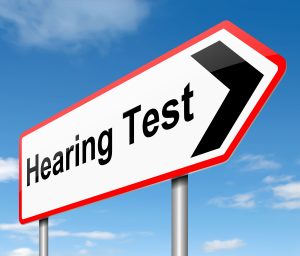- Treat any identified problems e.g. ear wax.
- Refer to audiology services if hearing loss suspected.

- If the person is prescribed hearing aids, they should be supported and encouraged to use them. This process can be difficult for anyone, with or without a brain injury. It may take several months to become used to and comfortable with hearing aids.
- If at any time, the person reports an acute sudden marked loss of hearing, an urgent medical referral is required in the first instance.
Following brain injury, the person may require a significant amount of support in order to manage their hearing aids due to cognitive and/or physical problems which may result in the following difficulties:
- Reduced ability to independently switch on, insert and clean hearing aids.

- Reduced ability to recognise when batteries need replacing.
- Reduced ability to change the batteries/acquire new batteries.
- Difficulty remembering that they need a hearing aid.
- Reduced insight into hearing impairment and its implications.
For people with hearing impairment (whether or not they require hearing aids) the following guidelines may be helpful:
- Make sure everyone is aware of the person’s hearing impairment, how severe it is and how to help.
- Sometimes people with hearing impairment can be extra sensitive to noise and find some loud noises or particular sound frequencies uncomfortable. Brain injury itself may cause increased sensitivity to noise or exacerbate a pre-existing problem. It is important that any sensitivity to noise is recognised, appropriate advice is sought and the person is provided with the necessary support.
- Reduce extraneous noise and distractions in order to maximise hearing ability.
- Remember that busy, noisy environments can make hearing very difficult e.g. pubs, restaurants, shops, hospital wards, traffic in the street.
- Do not try and have an important conversation, give verbal information or provide therapy in noisy, distracting environments.
- During conversation, ensure the person with hearing impairment is facing you and your face is in good light.
- Do not cover your mouth or eat whilst talking.
- Natural use of gesture and facial expression may help support hearing.
- Speak in a clear voice but do not shout.
- Do not speak too fast, but equally do not go too slowly, maintain a natural sound to your voice using normal intonation patterns.
- Repeat information as necessary and remain patient.
- Remember that the person may also have other cognitive, communicative and psychological challenges which may increase the impact of the hearing impairment.
- Remain reassuring if the person is worried or anxious.
Support the person to attend meetings as necessary. It can be difficult to hear in such settings. Before attending any meeting, make sure that the person understands the purpose of the meeting, knows what matters will be discussed and has relevant information written down and available for them to go through. Give the person time and support to plan questions ahead of the meeting. During the meeting, write down important information and ensure the person has heard and understood it. Please note: any verbal or written information needs to take account of potential language, cognitive, perceptual or visual problems the person may have. Information must be as accessible as possible.
Following initial referral to audiology, the person with marked and distressing levels of tinnitus, with or without hearing loss, should be referred to an Audiologist specialising in the management of tinnitus and/or a hearing therapist. Appropriate support and management techniques may then be implemented.
If the person experiences vertigo, they may benefit from referral to audiology and/or Consultant ENT specialist. A programme of rehabilitation can then be implemented. ENT services will initiate onward referral to Neurology services if required.